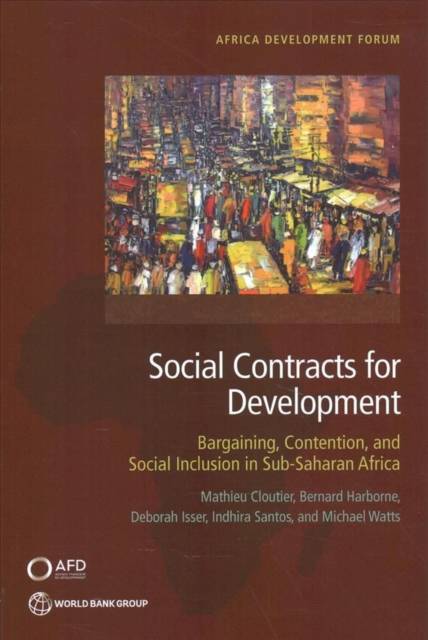
- Afhalen na 1 uur in een winkel met voorraad
- Gratis thuislevering in België vanaf € 30
- Ruim aanbod met 7 miljoen producten
- Afhalen na 1 uur in een winkel met voorraad
- Gratis thuislevering in België vanaf € 30
- Ruim aanbod met 7 miljoen producten
Zoeken
Social Contracts for Development
Bargaining, Contention, and Social Inclusion in Sub-Saharan Africa
Mathieu Cloutier, Bernard Harborne, Deborah Isser, Indhira Santos, Michael Watts
€ 63,95
+ 127 punten
Omschrijving
Sub-Saharan Africa has achieved significant gains in reducing the levels of extreme poverty in recent decades. Yet, the region continues to experience challenges across the development indicators, including energy access, literacy, delivery of services and goods, and jobs skills, as well as low levels of foreign direct investment. Exacerbating the difficulties faced by many countries are the sequelae of conflict, such as internal displacement and refugee migration. Social Contracts for Development: Bargaining, Contention, and Social Inclusion in Sub-Saharan Africa builds on recent attention to the real-life social and political economy factors that underlie the power dynamic and determine the selection and implementation of policies. Applying a social contract approach to development policy, the authors provide a framework and proposals on how to measure such a framework to strengthen policy and operational engagements in the region. The key message is that Africa's progress toward shared prosperity requires looking beyond technical policies to understand how the power dynamics and citizen-state relations shape the menu of implementable reforms. A social contract lens can help diagnose constraints, explain outbreaks of unrest, and identify opportunities for improving outcomes.
Specificaties
Betrokkenen
- Auteur(s):
- Uitgeverij:
Inhoud
- Aantal bladzijden:
- 122
- Taal:
- Engels
- Reeks:
Eigenschappen
- Productcode (EAN):
- 9781464816628
- Verschijningsdatum:
- 26/01/2022
- Uitvoering:
- Paperback
- Formaat:
- Trade paperback (VS)
- Afmetingen:
- 152 mm x 229 mm
- Gewicht:
- 235 g

Alleen bij Standaard Boekhandel
+ 127 punten op je klantenkaart van Standaard Boekhandel
Beoordelingen
We publiceren alleen reviews die voldoen aan de voorwaarden voor reviews. Bekijk onze voorwaarden voor reviews.







